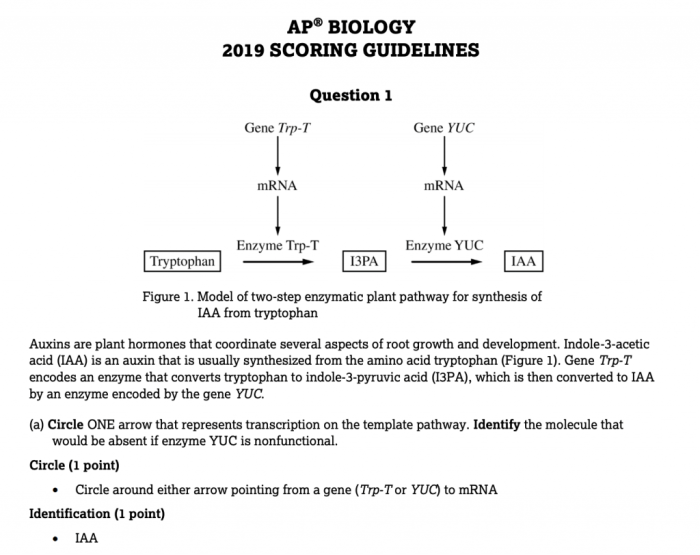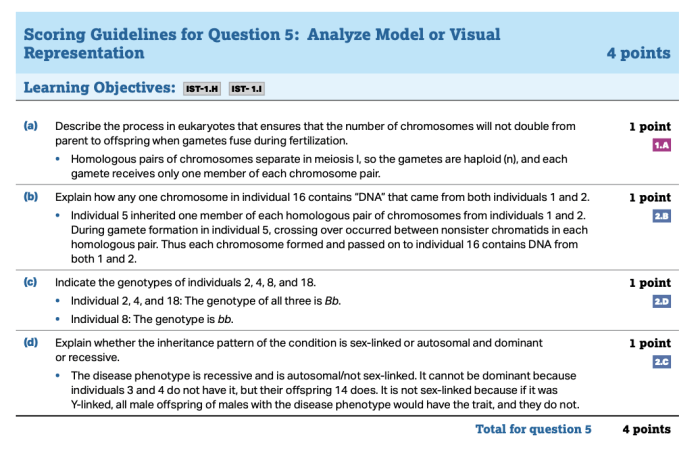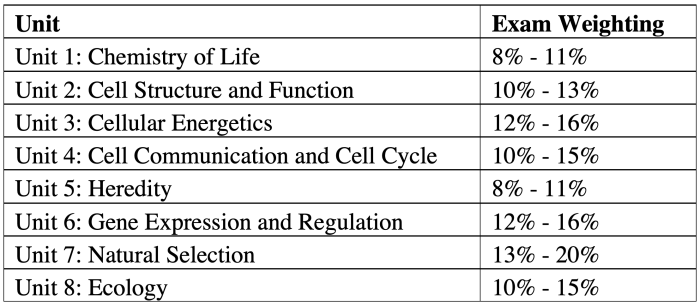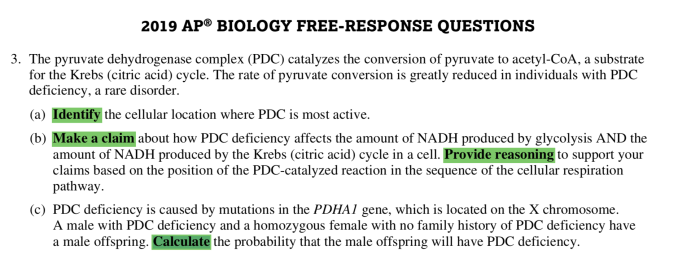Welcome to the ultimate guide to AP Biology 2013 FRQ Answers! Get ready to conquer this challenging exam with our comprehensive analysis, expert tips, and a treasure trove of sample questions and solutions. Let’s dive right in and unlock your AP Biology potential!
In this guide, we’ll break down the structure and key concepts of the FRQ, identify common pitfalls, and provide proven study strategies to help you excel. So, buckle up and get ready for an educational adventure that will empower you to ace the AP Biology FRQ!
AP Biology 2013 FRQ Overview

The Advanced Placement (AP) Biology 2013 Free Response Questions (FRQ) exam is a comprehensive assessment that evaluates students’ understanding of the fundamental concepts and principles of biology.
The FRQ exam is divided into two sections: Section A and Section B. Section A consists of six short-answer questions, each worth 10 points. Section B consists of two long-answer questions, each worth 15 points.
Exam Structure and Format
The AP Biology 2013 FRQ exam is designed to assess students’ ability to:
- Analyze and interpret data
- Apply biological concepts to real-world situations
- Communicate their understanding of biology in a clear and concise manner
The exam covers a wide range of biological topics, including:
- Molecular and cellular biology
- Genetics and evolution
- Physiology
- Ecology
FRQ Question Analysis

The 2013 AP Biology FRQ covered a wide range of key concepts and topics, including:
- Cellular respiration and energy metabolism
- Photosynthesis
- Gene expression
- Evolution
- Ecology
The difficulty level of the questions varied, with some questions being more straightforward and others requiring a deeper understanding of the concepts. Overall, the questions were well-written and provided students with an opportunity to demonstrate their knowledge and understanding of the course material.
Common Pitfalls and Challenges, Ap biology 2013 frq answers
Some of the common pitfalls and challenges faced by students on the 2013 AP Biology FRQ included:
- Not understanding the key concepts and terms
- Not being able to apply their knowledge to new situations
- Not being able to organize their thoughts and write clearly and concisely
Students who were able to overcome these challenges were more likely to perform well on the FRQ.
Sample FRQ Questions and Answers

In this section, we will provide a table with multiple FRQ questions and their corresponding answers. Each answer will include detailed explanations and justifications, highlighting the important biological principles and concepts demonstrated in each question.
Question 1: Protein Synthesis
Question:Describe the process of protein synthesis, including the roles of DNA, RNA, and ribosomes.
Answer:Protein synthesis is the process by which cells create proteins. It involves two main stages: transcription and translation.
To ace your AP Biology 2013 FRQ answers, you need to have a solid understanding of the subject matter. Just like the US Navy’s use of flags and pennants to convey important messages, your answers should be clear, concise, and informative.
US Navy flags and pennants have a rich history and symbolism, just as the AP Biology FRQ answers can demonstrate your knowledge and understanding of the subject. So, study hard and let your answers fly high!
- Transcription:In transcription, the DNA sequence of a gene is copied into a messenger RNA (mRNA) molecule. This occurs in the nucleus, where DNA is located.
- Translation:In translation, the mRNA molecule is transported to the cytoplasm, where it attaches to a ribosome. The ribosome reads the mRNA sequence and assembles amino acids into a polypeptide chain, which folds into a protein.
Biological Principles:
- The central dogma of molecular biology: DNA → RNA → protein
- The role of RNA polymerase in transcription
- The role of ribosomes in translation
- The importance of the genetic code
Question 2: Cell Respiration
Question:Explain the process of cellular respiration, including the three main stages and the role of ATP.
Answer:Cellular respiration is the process by which cells obtain energy from glucose. It occurs in three main stages:
- Glycolysis:In glycolysis, glucose is broken down into two molecules of pyruvate.
- Krebs cycle:In the Krebs cycle, pyruvate is further broken down, releasing carbon dioxide and generating ATP, NADH, and FADH2.
- Electron transport chain:In the electron transport chain, NADH and FADH2 donate electrons to a series of proteins, which pump protons across a membrane. This creates a proton gradient that drives the synthesis of ATP.
Biological Principles:
- The importance of glucose as an energy source
- The role of ATP as the energy currency of cells
- The efficiency of oxidative phosphorylation in generating ATP
Study Tips and Strategies

Understanding biological concepts is crucial for the AP Biology FRQ exam. Mastering the concepts allows you to approach the questions confidently and apply your knowledge effectively. Practice problem-solving by working through sample FRQs and past exam questions. This helps you develop critical thinking skills and familiarize yourself with the types of questions you may encounter.
Time Management
Time management is essential during the exam. Allocate your time wisely, giving more attention to questions you are more comfortable with. Start with the easiest questions to build confidence and momentum. Use the remaining time to tackle the more challenging ones.
Stress Reduction
Stress can impair your performance. Stay calm and focused by taking deep breaths and reminding yourself that you are prepared. Don’t panic if you don’t know an answer immediately; move on to the next question and come back to it later.
Additional Resources

Enhancing your preparation for the AP Biology exam goes beyond textbooks and classroom notes. Various online resources, textbooks, and study guides can provide valuable support and guidance.
These resources offer comprehensive coverage of the course content, practice questions, interactive simulations, and expert insights to help you reinforce your understanding and prepare effectively for the exam.
Online Resources
- College Board AP Biology:The official website provides exam information, practice questions, and resources for students and teachers.
- Khan Academy AP Biology:Free video lessons, practice exercises, and personalized learning plans cover all units of the AP Biology curriculum.
- Bozeman Science AP Biology:Engaging video lessons, notes, and practice quizzes presented by an experienced AP Biology teacher.
- Crash Course AP Biology:Animated videos and concise explanations of key concepts in a fun and engaging format.
Textbooks
- Campbell Biology:A comprehensive and authoritative textbook that covers all aspects of biology, including the core concepts tested on the AP Biology exam.
- Biology: A Global Approach:A well-organized and visually appealing textbook that emphasizes the interconnectedness of biological systems.
- Biology: The Unity and Diversity of Life:A user-friendly textbook that focuses on the fundamental principles of biology and their application to real-world scenarios.
Study Guides
- Barron’s AP Biology:A comprehensive study guide with practice questions, review chapters, and strategies for exam success.
- Princeton Review AP Biology Premium Prep:A thorough study guide with practice tests, detailed content reviews, and expert tips.
- Kaplan AP Biology:A focused study guide that provides targeted practice, concise reviews, and exam-taking strategies.
FAQ Insights: Ap Biology 2013 Frq Answers
What is the purpose of the AP Biology FRQ exam?
The AP Biology FRQ exam assesses your ability to apply your knowledge of biological concepts to complex, open-ended questions. It tests your critical thinking, problem-solving, and analytical skills.
How is the FRQ exam structured?
The FRQ exam consists of six questions, each worth 10 points. The questions cover a range of topics from all units of the AP Biology curriculum.
What are some common pitfalls to avoid on the FRQ exam?
Common pitfalls include not reading the questions carefully, not understanding the biological concepts being tested, and not organizing your answers clearly and concisely.
